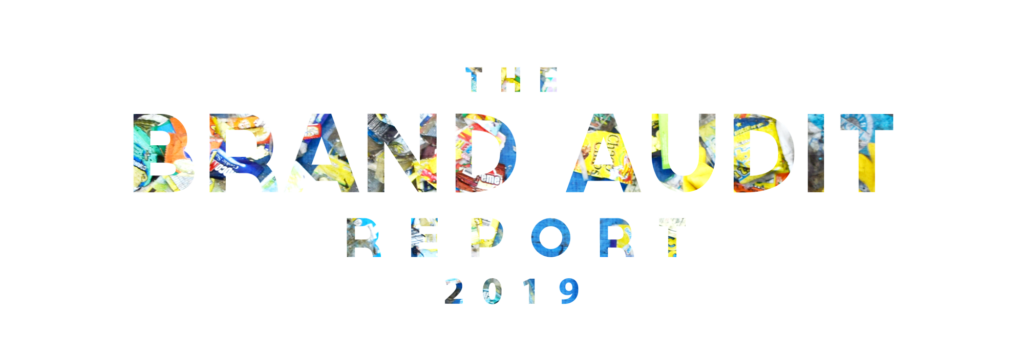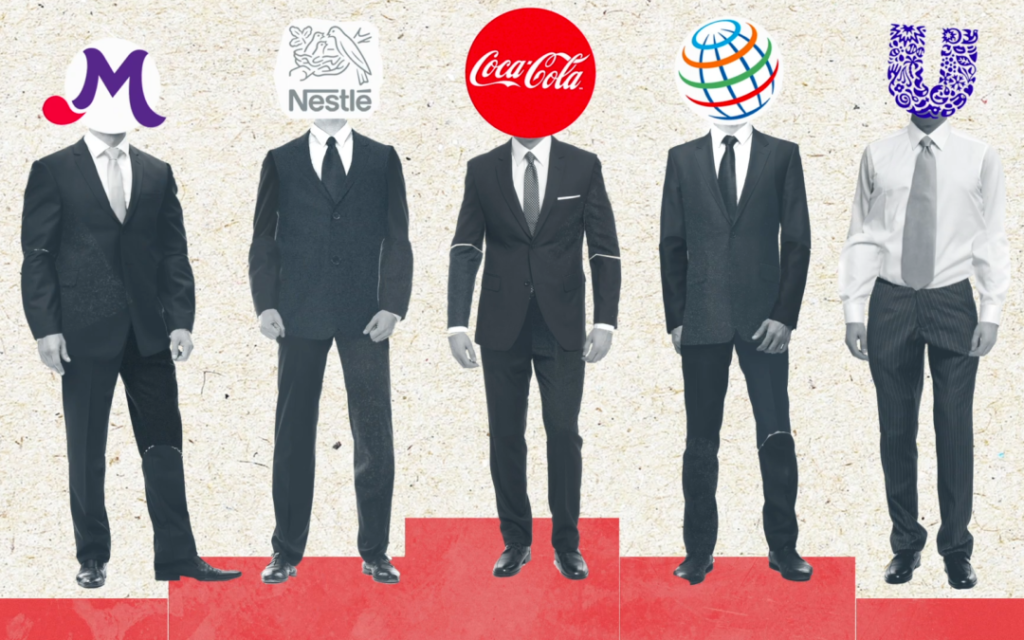Coca-Cola, Nestlé and PepsiCo Named Top Plastic Polluters for the Second Year in a Row
ANGLO AMERICA, EUROPE, CAPITALISM, ENVIRONMENT, ECONOMICS, 28 Oct 2019
Matt Franklin | Brand Audit – TRANSCEND Media Service
 23 Oct 2019 – Coca-Cola, Nestlé, and PepsiCo are the top 3 most identified companies in global brand audits for the second year in a row, according to a new report “BRANDED Volume II: Identifying the World’s Top Corporate Plastic Polluters.”
23 Oct 2019 – Coca-Cola, Nestlé, and PepsiCo are the top 3 most identified companies in global brand audits for the second year in a row, according to a new report “BRANDED Volume II: Identifying the World’s Top Corporate Plastic Polluters.”
Four hundred and eighty-four cleanups in over 50 countries and 6 continents, organised by the Break Free from Plastic movement in September, identified the top polluting companies. The rest of the companies rounding out the top 10 polluters are Mondelēz International, Unilever, Mars, P&G, Colgate-Palmolive, Phillip Morris, and Perfetti Van Melle.
“This report provides more evidence that corporations urgently need to do more to address the plastic pollution crisis they’ve created. Their continued reliance on single-use plastic packaging translates to pumping more throwaway plastic into the environment. Recycling is not going to solve this problem. Break Free From Plastic’s nearly 1,800 member organizations are calling on corporations to urgently reduce their production of single-use plastic and find innovative solutions focused on alternative delivery systems that do not create pollution,” said Von Hernandez, global coordinator of the Break Free From Plastic movement.
This year’s most frequently identified companies in the brand audits – Coca-Cola, Nestlé, and PepsiCo – have offered mostly false solutions to the plastics crisis, underscoring how important it is for voices from beyond the consumer goods sector to demand accountability and call for an end to single-use plastics. The list of top polluters is again filled with some of the world’s most commonly known brands.
“Recent commitments by corporations like Coca-Cola, Nestlé, and PepsiCo to address the crisis unfortunately continue to rely on false solutions like replacing plastic with paper or bioplastics and relying more heavily on a broken global recycling system. These strategies largely protect the outdated throwaway business model that caused the plastic pollution crisis, and will do nothing to prevent these brands from being named the top polluters again in the future,” said Abigail Aguilar, Greenpeace Southeast Asia plastic campaign coordinator.
“The products and packaging that brands like Coca-Cola, Nestlé, and PepsiCo are churning out is turning our recycling system into garbage. China has effectively banned the import of the US and other exporting countries’ ‘recycling,’ and other countries are following suit. Plastic is being burned in incinerators across the world, exposing communities to toxic pollution. We must continue to expose these real culprits of our plastic and recycling crisis,” said Denise Patel, US Coordinator for the Global Alliance for Incinerator Alternatives (GAIA).
Notes:
- This report is published under the responsibility of Greenpeace Philippines
- BRANDED Volume II: Identifying the World’s Top Corporate Plastic Polluters. (2019)
- 2018 Brand audit report: Branded: In Search of the World’s Top Corporate Plastic Polluters, volume 1 (2018)
- A Greenpeace USA report titled Throwing Away the Future: How Companies Still Have It Wrong on Plastic Pollution “Solutions,” recently called out companies for opting for false solutions.
Contacts:
Shilpi Chhotray, Break Free From Plastic Senior Communications Officer [Global/US]: shilpi@breakfreefromplastic.org, +1 703 400 9986
Jed Alegado, Break Free From Plastic Asia Pacific Communications Officer: jed@breakfreefromplastic.org, +63 917 607 0248
Matt Franklin, Break Free From Plastic European Communications Officer: matt@breakfreefromplastic.org, +44 792 337 3831
Go to Original – breakfreefromplastic.org
Tags: Capitalism, Coca-cola, Conflict, Development, Economics, Environment, Human Rights, Multinational corporations, Nestlé, Oceans, Pepsico, Plastic Pollution, Pollution, Public Health, Social justice, Solutions, Transnational Corporations, Violence, West, World
DISCLAIMER: The statements, views and opinions expressed in pieces republished here are solely those of the authors and do not necessarily represent those of TMS. In accordance with title 17 U.S.C. section 107, this material is distributed without profit to those who have expressed a prior interest in receiving the included information for research and educational purposes. TMS has no affiliation whatsoever with the originator of this article nor is TMS endorsed or sponsored by the originator. “GO TO ORIGINAL” links are provided as a convenience to our readers and allow for verification of authenticity. However, as originating pages are often updated by their originating host sites, the versions posted may not match the versions our readers view when clicking the “GO TO ORIGINAL” links. This site contains copyrighted material the use of which has not always been specifically authorized by the copyright owner. We are making such material available in our efforts to advance understanding of environmental, political, human rights, economic, democracy, scientific, and social justice issues, etc. We believe this constitutes a ‘fair use’ of any such copyrighted material as provided for in section 107 of the US Copyright Law. In accordance with Title 17 U.S.C. Section 107, the material on this site is distributed without profit to those who have expressed a prior interest in receiving the included information for research and educational purposes. For more information go to: http://www.law.cornell.edu/uscode/17/107.shtml. If you wish to use copyrighted material from this site for purposes of your own that go beyond ‘fair use’, you must obtain permission from the copyright owner.
Read more
Click here to go to the current weekly digest or pick another article:
ANGLO AMERICA:
- Trump, Epstein and the Deep State
- 'An Arsenal of Profiteering': Military Contractors Have Gotten Over Half of Pentagon Spending Since 2020
- Imperial Hypocrisy about “Terrorism” Hits Its Most Absurd Point Yet
EUROPE:
- Burying Genocide: The BBC, Gaza and the Role of the UK
- Raised in a Colonial Death Cult: 600 Years of KU Leuven and still...
- The Rise of ‘Antidiplomacy’ in a Powerless Europe
CAPITALISM:
- January 20, 2025
- The Dismal Pseudo-Science
- Trillions in Dirty Money: How Hidden Loopholes Fuel Corruption and Inequality
ENVIRONMENT:
- Hawaii’s Mauna Loa Observatory Captured the Reality of Climate Change--The US Plans to Shut It Down
- Criminal Negligence in the Degrowth Movement? Why Transformative Criminology Matters for Systemic Change
- Mother Earth Cries: They Bombed Me Again
ECONOMICS:
- From Private Profit to Public Power: World’s Richest 1% Increased Wealth by $33.9 Trillion Since 2015
- Eradicating Poverty beyond Growth: Reforming the Global Financial Architecture for Ecological and Social Justice
- Two Hundred Years Ago, France Strangled the Haitian Revolution with an Inhumane Debt By Vijay Prashad
